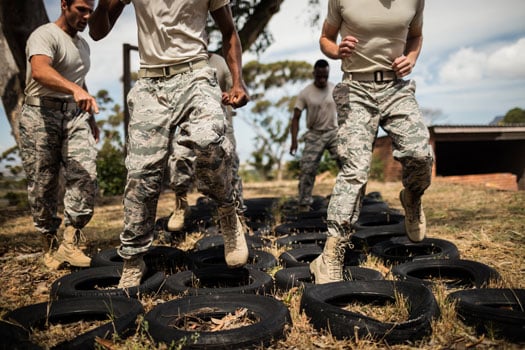
Lower back pain, or LBP, is one of the most common health-related problems in the United States, and it’s certainly one that can affect anyone. It's also something that can be an ongoing issue for people normally more active or likely to be involved in more strenuous activities, including people in the military. Today, we're focusing on some of the common causes of pain in the lower back area for anyone in the military.
Carrying & Lifting Heavy Loads
It's typical for military service members to frequently lift and carry heavy loads that place excess stress on the lower back. Over time, this added strain can contribute to lower back pain, which often stems from:
• Soft tissue strains and sprains
• Inflammation affecting spinal nerves
• Lumbar disc herniation
Repetitive Movements
A lot of the activities people in the military perform, whether these involve practice drills, daily routines, or various maneuvers, involve movements that place added pressure on the same parts of the back. These movements can also involve repetitive reaching and twisting while climbing or navigating narrow surroundings. When the lower back area is subjected to repetitive movements and the resulting strain, there's a greater chance of having issues with inflammation, muscle spasms, lingering soreness, and disc herniation.
Strenuous Activities, Motions, & Movements
When training, military members often have to make quick moves and pivots and do a lot of running associated with strenuous activities. This also applies to active combat situations. These forceful movements can affect muscles and nerves that, in turn, affect the lower back area. It's similar to the types of lower spine stress common in competitive runners and regular joggers. Spinal discs can also be affected by all this jostling and movement.
Lack of Sufficient Sleep
A Pentagon report found anywhere from 27 to 40 percent of service members reported issues with sleep deprivation due to lack of opportunities to sleep. This can be a contributing factor for lower back pain as well. The reason is because tissues in and around the spine naturally heal and recover from daily stress and strain with proper sleep. If this natural healing process is limited, there's an increased risk of injury and discomfort.
Diagnosing & Treating LBP in Military Members
Lower back pain for people in the military is diagnosed the same way as it is in civilian patients, usually with image tests and any other specialized tests that may be appropriate. Treatment typically involves physical therapy and medication. If a herniated disc is an issue, surgery may be recommended if initial treatments fail to provide sufficient relief.
If you're in the military in any capacity, it's not always easy to control the nature of your duties or physical actions. What you can do is take as many precautions to protect your lower back as possible by:
• Eating healthy, nutrient-rich foods
• Minimizing repetitive movements
• Maintaining proper form and posture
• Making an effort to get regular sleep
If your low back pain is severe and long-lasting, your doctor may recommend surgery to provide relief. For example, if you have a herniated disc that isn't responding to conservative treatment, a discectomy may be the best option. Although this is generally a very successful procedure, patients with a large hole in the outer ring of the disc have a significantly higher risk of reherniation following surgery. Often, the surgeon won’t know the size of the hole until beginning surgery, and having a large hole in the outer ring of the disc more than doubles the risk of needing another operation. A new treatment, Barricaid, is a bone-anchored device that closes this hole, and 95 percent of Barricaid patients didn’t undergo a reoperation due to reherniation in a 2-year study timeframe. This treatment is done immediately following the discectomy—during the same operation—and doesn’t require any additional incisions or time in the hospital. Barricaid has also received positive reimbursement from Tricare and the US Veterans’ Administration in recognition of its positive impact on minimizing the chances of reoperation for military services members.
If you have any questions about the Barricaid treatment, ask your doctor or contact us at 844-288-7474.
For full benefit/risk information, please visit: https://www.barricaid.com/instructions.


Comments